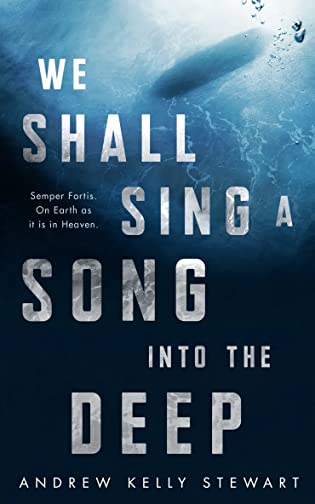 We Shall Sing a Song into the Deep by Andrew Kelly Stewart
We Shall Sing a Song into the Deep by Andrew Kelly Stewart Format: eARC
Source: supplied by publisher via NetGalley
Formats available: paperback, ebook, audiobook
Genres: dystopian, post apocalyptic, science fiction
Pages: 176
Published by Tordotcom on March 9, 2021
Purchasing Info: Author's Website, Publisher's Website, Amazon, Barnes & Noble, Kobo, Bookshop.org
Goodreads
Remy is a Chorister, one of the chosen few rescued from the surface world and raised to sing the Hours in a choir of young boys. Remy lives with a devoted order of monks who control the Leviathan, an aging nuclear submarine that survives in the ocean’s depths. Their secret mission: to trigger the Second Coming when the time is right, ready to unleash its final, terrible weapon.
But Remy has a secret too— she’s the only girl onboard. It is because of this secret that the sub’s dying caplain gifts her with the missile’s launch key, saying that it is her duty to keep it safe. Safety, however, is not the sub’s priority, especially when the new caplain has his own ideas about the Leviathan’s mission. Remy’s own perspective is about to shift drastically when a surface-dweller is captured during a raid, and she learns the truth about the world.
At once lyrical and page-turning, We Shall Sing a Song Into the Deep is a captivating debut from newcomer author Andrew Kelly Stewart.
My Review:
Based on some of the blurb descriptions – which call this a combination of the SF classic A Canticle for Leibowitz and the military suspense classic The Hunt for Red October, I went into this book with certain expectations – in spite of never having read Canticle.
(A Canticle for Leibowitz is so foundational to SF that even if you haven’t read it, you’ve heard of it and have at least a vague idea of what it’s about. And there are plenty of summaries available to fill in any gaps.)
So, expectations. Expectations that weren’t exactly met. Which doesn’t mean that they weren’t exceeded – because they were. We Shall Sing a Song Into the Deep takes elements from those books cited, a post-nuclear-apocalyptic world and a story that is steeped in nuclear brinkmanship and set in the claustrophobic confines of a submarine, turns those expectations upside down and sends them on a deep dive into times and places that the reader – or at least this reader – was not expecting.
Because in spite of that tantalizing combination of antecedents from the blurb, this story isn’t really all that similar to either of the other books.
But the crew of that submarine, the former U.S.S. Leviathan, thinks that it is. They believe that they world has ended in a nuclear holocaust, that civilization has fallen and that the survivors outside of their ship are diseased and savage and mutated. And out to get them.
And they’re almost right. Also, totally, completely, utterly and absolutely wrong.
 Escape Rating A-: Like A Canticle for Leibowitz, this is a story that combines the worship and rituals of a Catholic monastery with a post-apocalyptic world. Then it turns the rest of the classic story upside down.
Escape Rating A-: Like A Canticle for Leibowitz, this is a story that combines the worship and rituals of a Catholic monastery with a post-apocalyptic world. Then it turns the rest of the classic story upside down.
Not that the apocalypse doesn’t happen in both stories, but that’s where the similarity ends. Canticle is about the preservation of knowledge, where Song is actually about its destruction. The mission in Canticle is the result of the destruction, where the mission in Song is about the cause. It also feels like Canticle is honest about its faith where Song is about the corruption of it.
Also, a bit of Lord of the Flies wouldn’t be out of line in the description of what went into the mix for this book. Because in the tiny world of the Leviathan there’s definitely more than a hint of power corrupting into repression and violence, bullies rising to the top through the success of their bullying, and thought police – to mix in yet another classic metaphor – suppressing everything that runs counter to approved thought and belief.
And there’s more than a touch of alternate history mixed in, but I’ll leave for you to discover.
While the story has a bit of a slow start – because conditions aboard the Leviathan are grim and gruesome and dark and dank. And the main character seems to be scared, defenseless and alone and it looks like things are only going to get worse but not necessarily more exciting. At least at first. (But then it’s a very short book so the slow start doesn’t take all that long to get beyond.)
And the reader does go into the story with all those assumptions. But as we follow Chorister Remy around on this ship that is so obviously on its last metaphorical and mechanical legs, the assumptions start peeling back like a rotting skin, only to reveal that the rot goes all the way through to the bone.
But those bones conceal a whole lot of truths. And once Remy starts to see those, it’s a race to see whether anything, or anyone, can be saved. Or should be.
